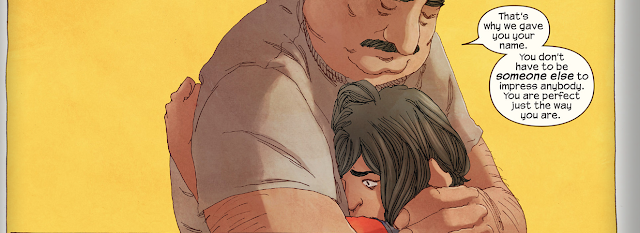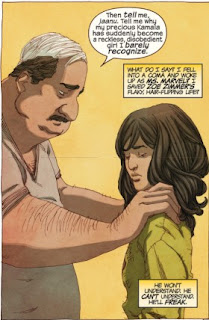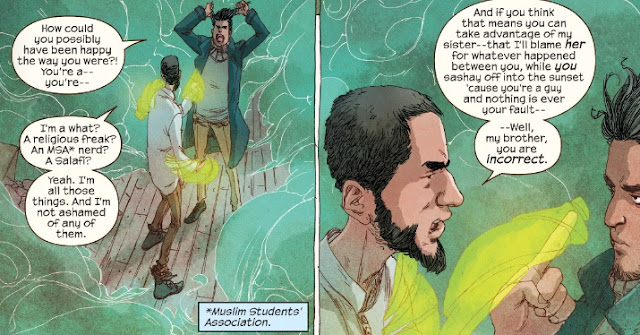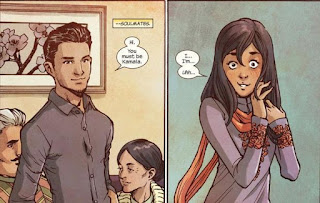Okay, let's start this off right: I am by no means an expert in Islam or in Islamic culture, Muslim culture, or even in Pakistani-American culture. I took one introduction to Islam course in college, which I enjoyed, but that by no means qualifies me to speak in any significant way about the topics to follow. What I am qualified to talk about is stories, and in this case, while I don't have much substantial to say about Islam, I can speak to the way that it is portrayed in comics. Ms. Marvel, to be particular.
So, with that out of the way, today I want to talk to you guys about representations of Muslim masculinity in the media. Mmm. That's guaranteed to be a fun one, huh?
The recent Ms. Marvel is a fantastic comic. In large part that's because of it's heroine - Kamala Khan, a nerdy, superhero obsessed teenager with a burning passion to help people. Kamala is kind of a mess, but she's a mess in all the right ways. She's reminiscent of an early Spiderman. A high school student who suddenly gains superpowers and can play in the big leagues but still has to be home by curfew. The one really big curveball in Kamala's story is that she's Muslim and therefore one of the very first Muslim superheroes.
Kamala's religious background isn't the sum total of her character, but it's not written out either. A daughter of Pakistani immigrants, Kamala was raised in a very religious household. Her family is pretty devout, and while Kamala herself is generally ambivalent about a lot of parts of her culture, she does seem to hold to her faith. It informs her work as a superhero and inspires her. I love that. I even wrote a whole other article about it a year ago.
What I didn't get to in that article is how the male characters in this comic are portrayed with relation to their faith. As much as Kamala is a big step forward for representation of Muslim women, the men in her life are big steps forward for representations of Muslim men. Seriously. Even better, there are four different major male Muslim characters in the Ms. Marvel comics (say that five times fast), which provides us with a wealth of different ideas of what it means to be a Muslim man in America today. And that's great.
The first and most obvious representation we get is Kamala's father. From the beginning we know a couple of things about Mr. Khan. First, we know that he is a rather strict, slightly overbearing father, but that this is more cultural than religious a lot of the time. Kamala's father - Jusuf Khan - is a banker, a conservative man, and generally pretty content with his lot in life. He wishes sometimes that his daughter were less of a nerd and more religious, and he wishes frequently that his son had more motivation in life and less religious. In other words, Jusuf Khan is a pretty normal dad.
And that in and of itself is a new and different representation for a male Muslim character. The idea that there's nothing radical about Jusuf at all is and an of itself kind of radical. Granted, we only know Jusuf through his daughter's eyes. The whole story is told from Kamala's point of view, but even through the eyes of a rebellious teenage girl, Jusuf still comes out in a pretty good light.
For starters, he might be an over-protective father, but he clearly cares a lot for Kamala. Early on in the series, worried that Kamala is sneaking out at night and making questionable choices, Jusuf takes her aside and talks to her. Not yelling at her or anything, but explaining how much he and her mother love her. He tells her the story of her name, which means perfection, and reminds her of how desperately they wanted her as a daughter. She was a surprise, but a welcome one. In other words, Jusuf might be overbearing at times - he does ground Kamala in the very first episode - but he does it because he loves her.
His overbearing attitude is also something that makes him a more complex and therefore interesting representation of Muslim masculinity. See, like I said above, Jusuf isn't actually overly religious. So when he's concerned about his daughter and wants her to spend more time with the Muslim Student's Association, it's not because he's horrified that his daughter has gotten horrible "feminist" or "Western" ideas in her head. He's not some horrific stereotype of an oppressive Muslim tyrant. He's a worried dad with a teenage daughter who's basically sending her to youth group.
In general, the beauty of how Ms. Marvel deals with Kamala's religion in general and particularly with her father is in how it completely normalizes it. Because the story gives us an inside view of a Muslim family, we're forced to see these people as human beings, not stereotypes. So no one is a radical, no one is screaming "Death to America!" Kamala's family is a bunch of statistically average Muslim Americans. Normal people. And with that comes the understanding that the problems they face are completely normal problems.
I mean, the problems Jusuf faces? Extremely universal. His daughter is getting interested in boys and he doesn't necessarily approve of the boys she likes. Said daughter has also started sneaking around and might be drinking. Like any protective father, he immediately grounds her and then tries to figure out how to surround her with good influences. Normal, right? And then there's his son, a brilliant young man in his twenties who won't move out of the house and get a job. Jusuf supports his son because he loves him, but he also constantly needles Aamir about getting a job.
Like I said, normal problems.
Speaking of Kamala's brother Aamir, let's move on to him and another really interesting nuanced portrayal of Muslim masculinity. The beauty of this comic, I'll say again, is that it gives us a bunch of really different representations of what it means to be a Muslim American man in today's culture. Jusuf is one, but Aamir is also a good representation and a very different person.
Where Jusuf is religious but also very comfortably secular, Aamir is devoted to his faith in a way that the rest of the family finds kind of weird. Like your super-religious cousin who went to a retreat over the summer a few years ago and has spent every holiday since then trying to convince you to come along.* You know he means well. He clearly believes very strongly and sincerely. You don't have to believe just as much as he does to appreciate his faith. But it still might not make much sense to everyone else.
Aamir takes his faith very seriously. He doesn't work and he's not in school anymore. He spends his days studying the Qu'ran and listening to lectures at the mosque. But for all that he fits a lot of our stereotypes about young, overly intense Muslim men, there are many more ways that Aamir doesn't fit our stereotypes.
For one thing, Aamir is no radical. Instead of fitting with the white American stereotype that all young Muslim men are radicalized by their religion, Aamir is pretty ambivalent to politics. While he does try to influence his family members to be more religious, we don't even see him being particularly pushy with his faith in public. He mostly keeps to himself. If anything, his constant study of the Qu'ran has made Aamir less likely to push his ideas on others because he firmly believes that everyone needs to make their own way to Allah on their own. So there's that.
But probably the more surprising thing in Aamir's portrayal is how the comic presents him with regards to women's rights. While early in Ms. Marvel Kamala does get in a little spat with her mosque over their seemingly outdated gender roles and rules, Aamir himself turns out to be very, well, good about gender stuff. Like when Kamala's almost-boyfriend tries to imply that because Kamala snuck out with him one time she's to blame for everything else that happened**, Aamir immediately defends his sister. He refuses to believe that Kamala's actions make her automatically at fault because she's a girl, and while that should not be a surprising opinion for a character to have, it is a refreshing one.
Perhaps the most interesting part of Aamir's characterization, though, comes in the later comics when he is dosed with the same terrigen mist that gave Kamala her superpowers. Aamir is given a giant dose of the mist and when he wakes up he does indeed have superpowers. But, and this is the important thing, Aamir doesn't care.
Like, he's not devastated or enraged that he now has superpowers, but he's not excited either. As Aamir himself says, "I liked myself the way I was."
That's a pretty cool statement, especially for a young Muslim man to make in American-made media. In this little moment, Aamir is making a couple of things clear. First, he's showing us that he doesn't care about power. He doesn't need superpowers to feel good about himself and having them does nothing for his self-esteem. Second, though, he's also showing that he didn't view himself as deficient in any way before he was dosed. Aamir likes himself and there was nothing about himself he wanted to change.
That is freaking radical and amazing. See, here's a representation of a young Muslim man, openly religious, kind of conservative, but who doesn't feel ashamed of any of this. He doesn't apologize for his religion. He doesn't pretend it makes him less of an interesting and worthwhile person. Aamir likes himself exactly as he is, and that's the most powerful statement he could make.
Seriously, Aamir for the win.
Unfortunately, not all characters can be as enlightened and, well, good as Aamir. Kamala's kind of almost-boyfriend, Kamran, is one of the other major representations of Muslim men in the comic, but unlike the first two, Kamran's not a nice guy. In a weird way this is helpful too, as it shows that we're not making a world where every Muslim is automatically good. That would be just as dehumanizing as a world in which every Muslim character is automatically bad, because in both cases they are presented as being somehow other than human. Humans make mistakes and we can be bad or good or some mush of the two. Most of us are a mush. So it's important that Ms. Marvel, in striving for better representation of Muslim American men, gives us a character who isn't a good guy after all. And that's Kamran.
Originally introduced as a love interest for Kamala, he quickly becomes better understood as her foil. Also a nerdy Pakistani-American who wants superpowers super bad, Kamran was dosed by the terrigen mist as well and became an Inhuman with cool powers. Unlike Kamala, however, he doesn't use his powers to help people. Kamran uses his powers to hurt people and force them to do what he wants. While Kamala is charmed by Kamran for a while, his true nature shines through soon enough and she's forced to fight him.
What makes Kamran really interesting is how, like Kamala, his religion informs his actions but doesn't account for all of them. Like her, he's not super religious but he is culturally aware. Unlike Kamala, Kamran doesn't see the moral lessons of Islam as being at all relevant to his superpowers. He's a bad guy. He's not a bad guy because he's a Muslim, he's a bad guy who happens to be Muslim as well. Also he's a super creepy kind of stalker, so in general not someone we want hanging around.
Again, the value of Kamran's character is that he subverts our expectations of what a "bad" Muslim looks like. According to what the media is always telling us, a "bad Muslim" should look more like Aamir. Outwardly religious, dressed in traditional clothes, always hanging out at the mosque. Kamran, meanwhile, looks like a "good Muslim". He's Westernized, has cool gadgets, likes pop culture, and seems pretty dang assimilated. In making Kamran the bad guy, Ms. Marvel is going against our stereotypes about young Muslim men, and that's awesome.
Finally, before we go I want to give a shoutout to the last major Muslim man who appears in Ms. Marvel. While not a particularly big part, and definitely not as big as these other ones, it's worth pointing out that Kamala's interactions with Sheikh Abdullah, the youth lecturer at her mosque, are some of the most interesting of the series.
Upon first meeting him, Sheikh Abdullah seems like your standard boring youth pastor type. He's lecturing them on how to be good people and blah blah blah while Kamala blatantly ignores him and sneaks out for a smoothie. But later on, Kamala comes back to the Sheikh and asks his advice. She's conflicted about how her superheroing is affecting her life, and she wants advice. It's a scene just like when Matt Murdock goes to his priest to talk about being Daredevil, and the story treats it as such.
Contrary to what we might expect, Sheikh Abdullah doesn't immediately tell Kamala that she needs to stop what she's doing and be a good little girl. Instead, he gives her real advice: do the right thing, even if it's hard and people don't appreciate you for it. Do the right thing anyway.
It's a small scene, but it has a big impact. This scene is really the catalyst for Kamala's decision to commit to her superheroing. It's a moment when realizes that her faith doesn't have to be in conflict with her actions. And it's a really freaking well written scene.
Look, if you take nothing else from this article, I hope you can at least see the value of Ms. Marvel's wealth of male characters. By presenting us with no less than four very different models of Muslim American masculinity, the comic avoids reinforcing stereotypes. There is room for all of these men to be fully realized and interesting characters. In the end, the only thing we really can conclude about Muslim masculinity is that it's very diverse, even in the same family.
Ultimately, I think that's the only conclusion we ought to come to.
It's easy to look at a culture you don't understand and try to pigeonhole all of them into a few neat stereotypes. But people defy categorization. The better you get to know a group of people, the harder it is to write them all off. By presenting their characters as a variety of very normal people in very normal situations, Ms. Marvel reminds us that the horror show we see on the news is only a fraction of the real story. The real story is that there are 1.6 billion Muslims in the world and they span just as much a range of good to bad to crazy as any other group of humans on this planet.
By showing us a range of Muslim masculinity, Ms. Marvel forces us to remember that Muslims are people, not just statistics on the news. I appreciate that.
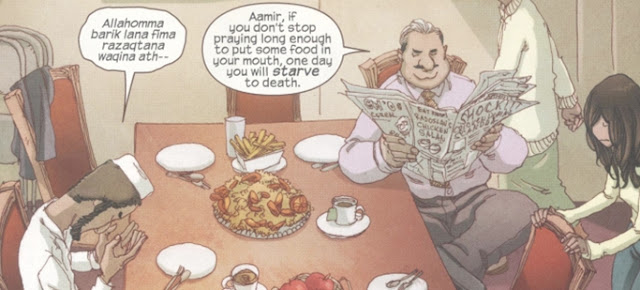 |
| I also really appreciate this scene. |
**Not anything sexual, actual superpower stuff.
